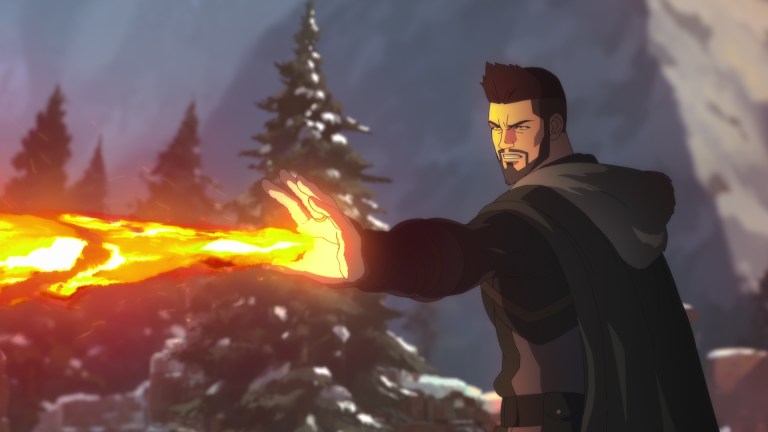The Witcher: Nightmare of the Wolf Review – A Serviceable Supplement to The Netflix Franchise
The Witcher: Nightmare of the Wolf holds back on scale but makes a solid case for more 2D animated Witcher.

This The Witcher: Nightmare of the Wolf review contains no spoilers.
The animated fantasy world of The Witcher: Nightmare of the Wolf feels trapped in an 83-minute film. No doubt it is lovely to look at as a Netflix Original Anime—a stricter definition of “anime” is stretching it, being applied to the work of a South Korea-based animation company. For as much as Studio Mir’s smatterings of color and movement will please the eye as it did with Legend of Korra and Kipo and the Age of Wonderbeasts, the mission of the story is lost in a haze.
Produced and penned by Witcher staff writer Beau DeMayo, Nightmare of the Wolf focuses on Vesemir, the mentor of the star of the Netflix series, Geralt. Vesemir is a slight antithesis to the grumpish Geralt played by a grimy and guttural Henry Cavill. The man who will become Geralt’s teacher is a smug Casanova type, a profane hedonist who would rather sleep, eat, and drink away when he’s not slaughtering beasts for coin. Theo James, reprising the role after a one-line voice cameo in the live-action show, is Castlevania’s Hector voicing a suaver Trevor Belmont. (Kim Bodnia will play Vesemir in the second season of The Witcher.)
Steeped in the fantasy world of Andrzej Sapkowski’s books, Vesemir’s land is wrought with tensions between humans and Witchers, the latter race being magically engineered from experimentations on human children, “mutagen alchemy” as it is called. Witchers and their mercenary ways aren’t well received in society, even if the locals require their special bestial expertise, and it doesn’t help that Vesemir refuses to fit a romantic picture of a mercenary saving the day. After he slays a lechen, he amorally collects gold and silver from the monsters’ slaughter victims and strands a surviving child to be picked up by a passerby. Vesemir’s apathy contributes to a public narrative that Witchers are immoral.
This gives ammo for the nobleborn witch Tetra (Lara Pulver) to divulge her suspicions of the Witchers to her royal court, citing the scruples and cons of Witchers. She’s especially skeptical of the king’s advisor Lady Zerst (a buoyant Mary McDonnell), a commoner married into nobility, who stands to prevent a war between Witchers and the kingdom.
For Vesemir, being a Witcher was all choice for him despite his peers often getting snagged into the vocation against their will, be it parental abandonment and sometimes through the Law of Surprise. Whether a poor chap is snagged by cruel fate is irrelevant to him. Vesemir’s interest in the profession began with observing Deglan (Graham McTavish), an elder Witcher, methodically exorcise a demon creature from a noble lady’s body and earn a hefty sack of gold. Sick of changing bedpans for nobles, Vesemir fled his life of servitude for the Witcher base of Kaer Morhen where his body and mind undergo grueling trials to give him the expertise and physicality of a Witcher. But while sprouting into a star Witcher, Vesemir rejects Deglan’s call to teach the next monster-slaying generation. Eventually, Vesemir is whisked into investigating a beast-related mystery regarding a lechen that speaks elvish tongue.
Indecisive smatterings of flashbacks, intended to drop clues and foreshadowing just as much as flesh out Vesemir, fracture the pacing. As The Witcher: Nightmare of the Wolf submerges, abruptly, into Vesemir’s childhood, its young adult nature is at odds with the more adult feel of the present timeline. It’s not until a third through the movie that the plot incentivizes momentum.
Credit is due to the watchful artistic eye of director Kwang Il Han, who deploys Studio Mir talents in fights sequences. Witcher and non-Witcher viewers alike can appreciate the embellishments achievable in the grace of animation to the swishing of Brian D’Oliveira’s scoring. The dramatic highlight is a transformation process that illuminates Vesemir’s rebirth into a new man, paired with a letter reading of a childhood sweetheart saying farewell, mingling melancholy and pining with physical agony. Select sequences could spotlight choreography alone, such as a witch’s balletic dance to shroud a landscape and a climactic combat that punctuates an ensuing tragedy with a rude awakening. It also doesn’t slouch on macabre bestial designs.
Other internal qualities are not as realized or the worldbuilding, while present, lacks breathing space to inspire any intense feelings, be it revulsion or pity or both, for the morals and motives of its side characters. While well voiced by Dota star Pulver, Tetra is vaguely rendered to full potential, an excuse for a final boss rather than operating as a morally complicated force as the script promises for her. In another example, Filandrevel, the exiled elf king encountered by Geralt in The Witcher and reprised by Tom Canton, amounts to little impact.
He operates as a momentary foil to Vesemir—possibly a red herring to a mystery—but barely scratches a dent in the plot when they cross paths again. Whereas his appearance of a hidden elven race oppressed by human colonists, could add breadth to the world as it did with his debut in the series, he and the backdrop of elven genocide feel emotionally remote from Vesemir’s arc or a lived-in feel for world-building.
An emotional anchor slams at the 40-minute mark thanks to a reunion that acts as a heart wrenching sneak attack—and dagger-sharp dialogue with both humor and heart. This is where the magical universe is the most lived in, drenched with the bittersweetness of star-crossed companions who grew eons and fates apart. Their wistful chemistry elegantly imagines two souls affected by the fantastical and transformative circumstances and I dare not speak of its final image. It’s tougher to absorb the potential poignancy in the other peeps of tragedy bursting through acts of deceptions and desperation and unfolding plights.
Longer than an average hourly Witcher episode, The Witcher: Nightmare of the Wolf as a film overstays its compacted length, as if its painterly realm, Vesemir’s history, and cast would unfurl better as an animated miniseries than a film. The movie leaves a few curious loose ends, enough you may suspect this to be a stealth pilot or hinting to other stories elsewhere in the franchise. They do not, thankfully, fall into the trap of serving as cliffhangers for this self-contained film. At best (coming from someone who has only seen the Netflix series and did not play the video games or read the books), Witcher fans may find it to be a pulp pleaser. It isn’t exactly an underbaked cake. Even for its shortness of flavor, the few sweet crumbs make a solid case that it deserves more.
The Witcher: Nightmare of the Wolf premieres August 23 on Netflix.
